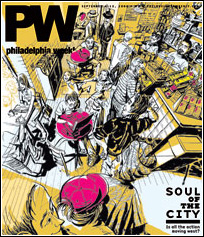Chinatown Redux
Middle class Asians are rediscovering the joys of residing in the old neighborhood.
From the July 23, 2008 Philadelphia Weekly.
The blond couple caresses each other as they sit in the thick grass on a gentle hill adjacent to a small pond. Her hair blows in the light breeze as she disinterestedly stares ahead. The Ken doll beside her stands up slowly, dramatically dragging his hand across her shoulders as he exits the screen.
"You don't bring me flowers," croons Anita Fung, reading the lyrics that accompany the visuals on the 50-inch television.
"You don't sing me love songs," bellows her husband Raymond, his deep voice reverberating through the tinny speakers.
"You hardly talk to me anymore, when you come through the door at the end of the day," Anita sings back.
On the TV, the blond couple strolls around a European-looking village of pale limestone walls and cobblestone streets. When the instrumental part of the Barbra Streisand/Neil Diamond 1978 classic rolls around, the couple splits apart without looking back.
"Is very nice song, isn't it?" Anita, 59, asks me over the microphone as the violins rise and the piano hits the crescendo.
Then she and Raymond, 60, belt out the end of the melancholy tune.
"You'd think I could learn ... how to tell you goodbye," they wail together. "'Cause you don't bring me flowers anymoooooore."
As the couple extends the "more" for several seconds, the dozen people gathered in the Fung's penthouse apartment at the GrandView Condominiums in Chinatown begin to applaud and hoot.
But there's no time to soak in the cheers.
Anita hustles to the karaoke machine and pops in the next tune. The party is just getting started.
***
Five years ago, this scene would have been impossible.
Anita and Raymond operated a pair of restaurants in Chinatown - the Cherry Street Kosher Restaurant and South East Chinese Restaurant. To get there they'd drive an hour each way from their home in the northern reaches of Bucks County. They'd arrive at the restaurants early in the morning and leave 12 or 13 hours later, exhausted. It was a commute they made for more than 20 years.
"The suburbs are calm and peaceful," Raymond explains. "You have a nice lawn. It's like a dream to some people."
When the couple came to America from Hong Kong 34 years ago, Chinatown was crowded and dirty with a hint of desperation. It was a place for new immigrants, and when people could afford to leave the neighborhood they did.
Things have changed.
When their grown son left the family home in 2004, the Fungs decided to sell their suburban home and join the Chinatown community full-time.
They first looked at converted lofts at TenTen Race Street, then discovered the GrandView, which is about the time the wave of middle-class Chinese people started flowing back into Chinatown.
"Right now there's a new trend of people who just stay in Chinatown," Raymond says. "It's totally different than 30 years ago."
***
"Which song you like?" Anita asks me with a force that tells me there's no way I'm not singing this evening.
She has a closet full of milk crates containing two-decade-old laser discs. I browse through and find Burt Bacharach, Carole King and Neil Sedaka's greatest hits.
"Come on, George, this is a good song," Anita snaps at me while placing the microphone in my hand.
The next thing I know, I'm singing a duet.
"Memory, all alone in the moonlight," we harmonize. "I can smile at the old days, I was beautiful then. I remember the time I knew what happiness was."
The Fung's friends - mostly empty nesters like Anita and Raymond - applaud politely, but I sense sarcasm in their Cantonese banter. The slow song and my droning have killed the mood.
Then Anita drops some peppy Chinese music into the machine. As Moonlight Tong, Anita's friend, sings to a jaunty beat, Raymond and a few others start to cha-cha in the center of the living room.
***
Because Chinatown is boxed in on three sides by the historic district, the Gallery and the Convention Center, there have long been fears that the condo boom would price Asians out of the neighborhood.
The effect would be akin to an ethnic amusement park: non-Asians residing in an area occupied by Asian businesses operated by people who live elsewhere.
But at the GrandView, at least, the Chinese community is strong and active.
"My wife has so many friends here," says Raymond, who sold his two restaurants in 2005 (but kept the karaoke machine).
Asians occupy about a third of the 16-story 194-unit building. Many residents are restaurant, bakery and supermarket owners in Chinatown who lived in the suburbs before the building went condo in 2004.
Residents walk to work, play ping-pong on the second floor, compete in mah-jong in their apartments and sing karaoke in the Fung's home.
"Anita's our captain!" jokes Yi Ling "Julie" Miao, a GrandView resident and owner of the Empress Garden restaurant on 10th Street.
***
We eat pork dumplings, oxtail stew and a soup of dry conch, octopus, barley, pork and whole chicken feet. Wine flows freely.
Even before the meal is over, guests commandeer the karaoke machine. Electronic music and high-pitched singing fills the room. As Anita clears the table and cleans dishes, she sways to the music.
The karaoke goes on for hours with performers rotating through moldy oldies and Chinese pop. People dance, some break into tai chi routines and many sing along.
A few people leave, taking the elevator to their homes on other floors. But the joyful singing continues.
Finally, Raymond hunches over and throws his left arm behind his aching back.
"I'm going to go lie down in my bed," he tells me. "Whenever you are ready, you can go. These girls will stay here and sing till 2 a.m."








